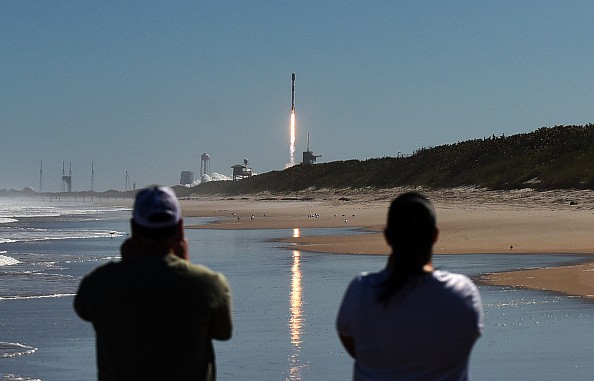
SpaceX successfully launched its Falcon 9 rocket on the morning of Wednesday, March 9. The starship holds 48 Starlink broadband internet satellites, which will be utilized in low-earth orbit to aid in enhancing internet access services across the globe.
Falcon 9's launch marks SpaceX's 10th total trip into the stars for 2022 alone. It certainly won't be the last, either, as SpaceX has plans to send at least one starship into the cosmos per week in 2022, a feat that seems overzealous yet relatively obtainable if all goes according to plan.
The Falcon 9 rocket took a similar path as its fellow brethren, strafing south from its launch zone in Cape Canaveral Space Force Station, thus forcing pilots and boaters to find varied avenues as most of the area was labeled as a "keep out" zone.
Youmei Zhou, a propulsion engineer, relayed amid the live broadcast: "Okay, Falcon 9 has successfully lifted off, carrying our stack of...49 Starlink satellites to low Earth orbit."
Related Article: SpaceX Launches 47 Satellites to Orbit in its 9th Falcon 9 Launch in the First 9 Weeks of the Year
The successful launch of Falcon 9 comes on the heels of SpaceX CEO Elon Musk's commitment to Ukraine, wherein he allotted even more Starlink satellite terminals to the country as Russia continues its invasion. Musk said in a Tweet posted on Friday, Mar. 4, that the company has been maintaining its efforts on strengthening "cyber defense and overcoming signal jamming," as the Russian invasion tests the cybersecurity knowhow under Starlink.
Another 48 Starlinks just reached orbit https://t.co/BLb2x69lvQ
— Elon Musk (@elonmusk) March 9, 2022
Likewise, the tech billionaire voiced his acclaim of the successful launch come Wednesday morning. Musk has been active in support of Ukraine while dealing with various domestic legal troubles surrounding SEC complaints. He has also voiced optimism of reopening nuclear power plants in Europe to combat the global climate issue.
Since 2019, SpaceX has sent well over 2,200 Starlink satellites into low Earth orbit. Not all of them, however, are operational, as only about 1,564 can relay broadband internet capabilities, says Jonathan McDowell, a Harvard astrophysicist who tracks and publishes various data surrounding Starlink and its mission.
Falcon 9's first-stage booster was utilized in three different launches prior to Wednesday's at Cape Canaveral. This was also the third mission for Starlink after 40 satellites were lost in the midst of a devastating solar storm, which safely burned up in reentry of the atmosphere.
Next on SpaceX's docket is the launch of the Axiom Mission 1, which is scheduled once again at Cape Canaveral for March 30, weather permitting. It's the first private mission with Falcon 9, which will carry a crew of astronauts to the International Space Station.
ⓒ 2025 TECHTIMES.com All rights reserved. Do not reproduce without permission.




